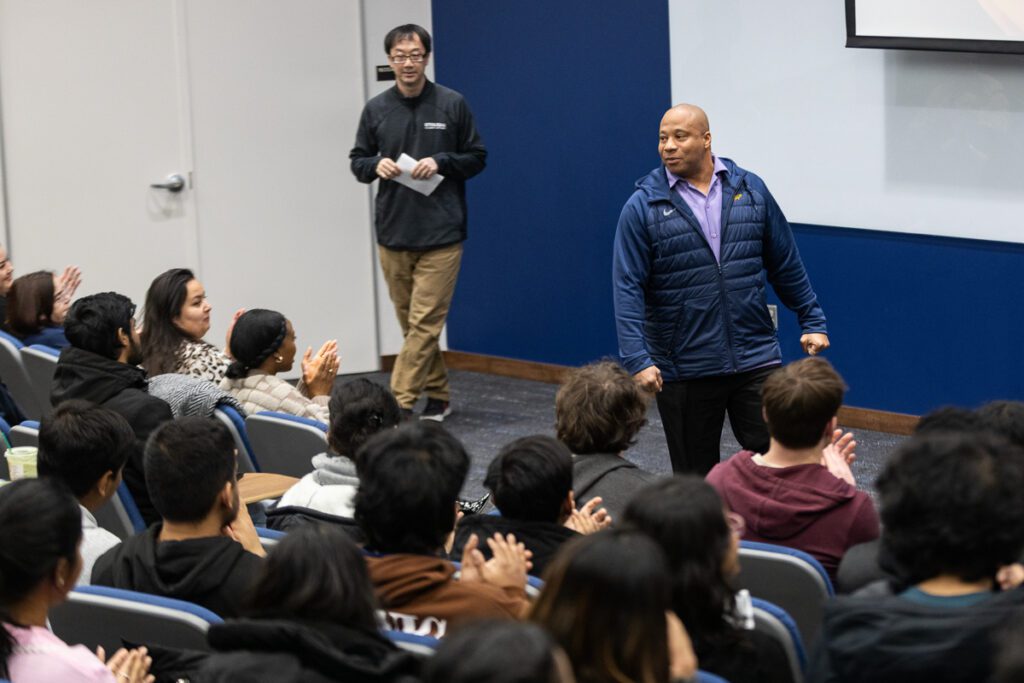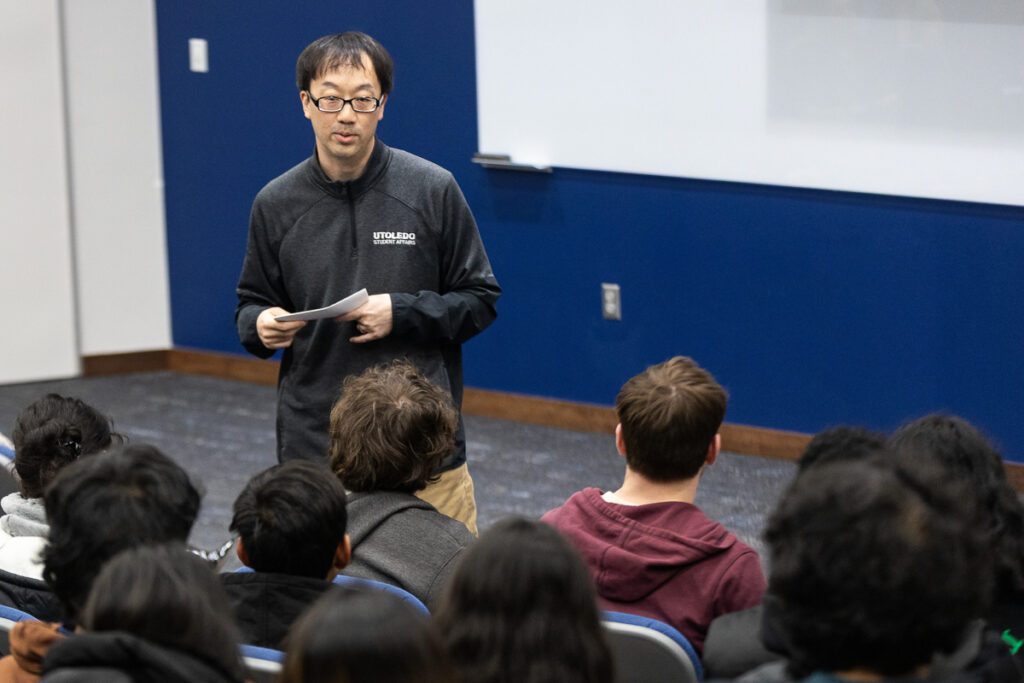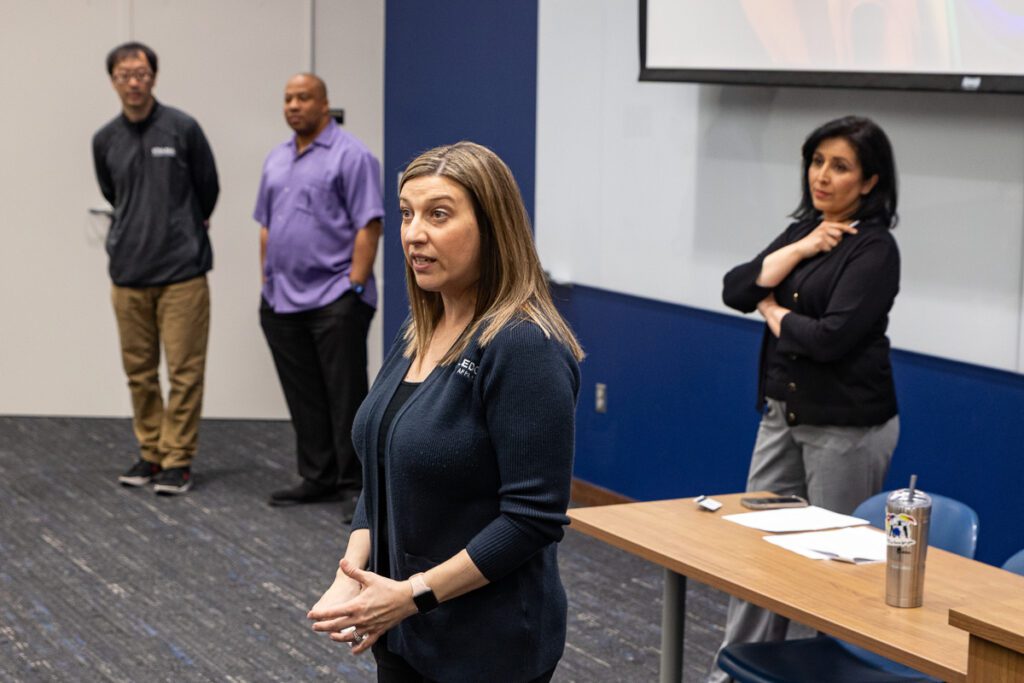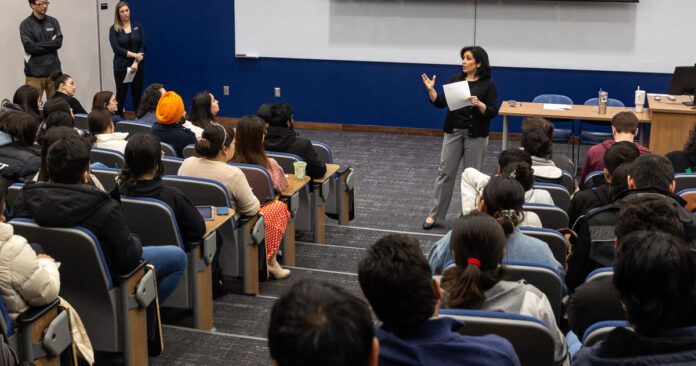TOLEDO – Anxiety and uncertainty marked an impromptu Q&A held by the Office of International Student and Scholar Services (OISSS) on the campus of the University of Toledo last Thursday, April 10.
About 200 students attended the event, originally meant to be held in the Snyder Memorial Building, but student demand forced the university administration to switch the location of the Q&A at the last minute to a larger room in the Health & Human Services building.
Addressing a room of nervous students, Sammy J. Spann, Ph.D., senior associate vice president and dean of students for the University of Toledo, opened up the session with reassurances, saying among other affirmations, “You are not alone,” before handing over the session to the OISSS department.

According to Spann, the Q&A was a direct request from the student body, a reaction to the handful of students who had their Student and Exchange Visitor Information System (SEVIS) record terminated.
SEVIS is the online record and status that allows nonimmigrant students to apply for and hold F-1 or M-1 Visas to study academically or vocationally inside the United States.
University of Toledo employees admitted that having a student’s SEVIS canceled in the middle of a semester was abnormal.
“I never used to check our SEVIS records,” said Jessica Bergman, manager of immigration compliance for UT, and added, “But we are checking them now; refreshing it everyday, many times a day.”
Bergman and Maryam Sediqe, J.D., the assistant director of the Center for International Studies and Programs at the UT, led most of the Q&A, and opened up the discussion by explaining that there are “many reasons why the government might terminate a [SEVIS] record.”
The two women said that, unfortunately, even under normal circumstances, the University would not be privy to the specifics about why a SEVIS record might be terminated. “Sometimes they give you a reason, but it’s not a specific reason,” Bergman said.
She added, “We’re not hearing anything from the government,” and told the students that the university was in contact with other institutions to cross-reference their information in hopes of deciphering any patterns.
In the face of so much uncertainty, OISSS recommended their students err on the side of caution until more information becomes available.
“I know students make mistakes,” Bergman said to the crowd. “But we don’t know how or why they picked [these students].”
Bergman and Sediqe cautioned the students to keep their records clean, even to avoid traffic violations; to be aware of what they post on social media; to avoid making waves that might be used against the students in any way; and for the students to avoid traveling right now.

Spann confirmed that Immigration and Customs Enforcement (ICE) officers had not been seen on campus as of the meeting.
“We have chaos all the time,” Spann said. “We’re learning how to navigate through this chaos.” And he reminded students that “the history of America has been way worse.”
Bergman and Sediqe told students if their SEVIS record was terminated, they would be contacted through the email the student used to apply for their current visa.
OISSS recommended all students familiarize themselves with immigration attorneys in the area, and said that the university had their own immigration attorneys to help students as long as they held status.
No students wished to share any information with the Toledo Free Press, but one student asked during the Q&A if the university would cover the costs of an immigration attorney or provide one to students if their SEVIS record was terminated. Bergman answered that the university would not provide an attorney in this circumstance, but that the university would recommend immigration attorneys to the students if their SEVIS record was terminated.
Sediqe told the students to carry all their travel documents with them, including their passport, visa and I-94, etc., or at the very least to carry copies of important documents in case an individual from ICE did stop them.
To verify to the officer, in the event that a student was stopped, Sediqe told students to ask for the officer’s badge, and said, “People can impersonate officers, and they have to show you their badge.”
She told students that their documents would have to be turned over to ICE for inspection if requested, but that ICE officers needed a warrant to search any place or items.
A delineation was made between the public parts of the university, where ICE would have access without needing a warrant, and private parts of the university, like classrooms and dormitories, where ICE officials would need a warrant signed by a judge.
Even with all the information, students were visibly uneasy, and a young woman expressed that fear during the Q&A.
“I’m trying to have all my bases covered, even though I haven’t done anything wrong,” she said.

OISSS tried to reassure the students, saying they had the backing of the provost to do everything in their power to keep the students in the country, and if staying in the United States was not possible, the university would try to help the students finish their degree, regardless of what country they were in.
When answering student’s questions, Bergman said the university had been able to cover the cost of a plane ticket back country of origin for one of the students who had their SEVIS records terminated. Bergman could not guarantee this type of help to all students, and said that the university would evaluate what they could do for students on a case-by-case basis.
“Maintaining your status…that’s the most important thing right now,” Sediqe said, and recommended students be prudent and continue attending classes to finish out the semester.
“There’s nothing special, except to carry all your documents with you, and maintain your status,” she said.





















